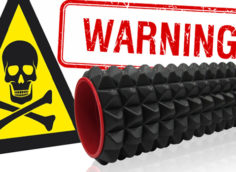The mental barriers in squatting are the most difficult for powerlifters to overcome. If you've ever squatted heavy in your life you'll know exactly what I'm talking about. You take the bar out and it feels like a ton. You struggle to stay upright and can barely adjust your feet. The idea of squatting the weight down and getting back up is ridiculous. You'll get crushed, stapled like a loser at the bottom of the rack.
But then it happens. You draw in your air, sit back into the hole and feel your hamstrings and glutes tighten up before exploding back up, driving that "impossible" weight to the start position. What you thought was impossible was anything but. That's overcoming a mental barrier.
Squatting is a Skill
To achieve the right squatting mindset, the first thing to realize is that squatting is a skill, like a javelin throw or a shot-put. Proficiency requires expert coaching and a ton of practice. You have to strive to make every rep the same – as close to perfect as possible.
Ed Coan once was asked to describe the importance of walking the weight out, something most lifters don't even think about. Ed proceeded to show how he walks the weight out and it was very clear every step was exact and specific, something he's done the same way for over three decades. There was no wasted energy or extra movement. While you may think this is technical or even physical, it's not. It's mental discipline and focus.
Overcome Fear: Do Box Squats
It's fear that keeps most lifters from achieving depth with heavy loads. That's why I love the box squat. It gives guys a target, so they don't feel like they're dropping into a bottomless hole they can't come back from.

The trick is to start with a high box and slowly drop it down as confidence grows. Also, always be mindful to never just drop on the box, get loose, or do any of the other dumb shit I see online all the time. The box is a tool, not a springboard. Sit back, stay tight, and in control.
Another way to accomplish this is with the power rack. Simply setting the pins a couple inches below the bottom position can give lifters the peace of mind they need to take the weight all the way down without fear of getting stapled.
Master Arousal
Understand over and under-arousal. While not being ready for the lift is obviously a problem, being too amped up can be a huge energy leak, especially before you're under the bar.
Drop the Excuses
Every lifter with a shitty squat has a litany of excuses for why they suck so badly. I have no time for these people. If your squat sucks, offer your excuses to someone who cares – which is nobody. And if you hate squatting, then don't squat! Do something else, anything, and preferably far away from me. Do you seriously think anyone cares about your trick knee or back issues? Every lifter has issues to contend with, so go see a doctor or shut up.
Squatting is Hard. Accept It.
There's no getting around it. A 10-15-rep set of squats will make you feel like your heart is going to explode. A one-rep max can leave you seeing stars. No magic tricks exist that suddenly make the lift feel easy. Just nut up and get under the bar.
Here's something I've never understood. Squatting is so problematic for so many lifters, yet everybody at some point wrestles with taking a stubborn shit on the toilet. And what do they do? Fill their bellies with air, bear down, strain like hell, turn purple, and give it all they got. If this doesn't work they stay there until the job gets done. So most lifters work harder on the toilet than they do in the squat rack.





